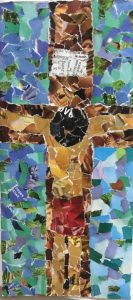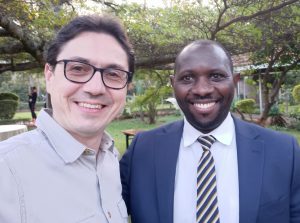In TAFES (Tanzanian National Movement), Discovery Bible Study (DBS) is one of the approaches we use, and it has captured the hearts of many students and associates!
We utilise DBS for small group study by following this simple process:
- one member reads the passage and
- the group retells the story (passage), then
- we answer a few main questions together; these are:
- What have I discovered about God?
- What have I discovered about people?
- How do I obey God through this Word?
- Who I am going to tell?
How did it start?
 It was during a staff retreat in February 2021 that our Campus Ministry Coordinator, Sister Joan Wanjiru, proposed trying the DBS method to see if it would be suitable for training students. We used DBS for the first time at that retreat and later in Discipleship
It was during a staff retreat in February 2021 that our Campus Ministry Coordinator, Sister Joan Wanjiru, proposed trying the DBS method to see if it would be suitable for training students. We used DBS for the first time at that retreat and later in Discipleship
Training Seminars (DTS) throughout the country. After the success in 2021, we repeated this study technique during DTS in 2023. Although Inductive Bible Study and Manuscript Bible Study are still in use, DBS has become the most loved and practised approach by many Christian Unions since its introduction.
Uniqueness of DBS:
There’s something special about Discovery Bible Study and its popularity is fostered by these unique advantages:
- Easy to teach and practice. Understanding how to use DBS requires simple training. The discovery questions (above) are easy to remember, making it accessible, even if it’s a person’s first time.
- Importance of application. The practice of DBS is not complete until a person specifically addresses the question of how they will obey the Word that is being studied.
- Tool for evangelism and discipleship. Through DBS, there’s always an increase in the number of people coming to Christ and the growth of members’ spirituality. Using this method of study with a non-believer may draw them to Christ and provides an opportunity for members to tell others about the Word of God.
- Connects people in the group. Since DBS preserves the principle of small groups, participants get to relate to each other beyond just discussing DBS questions.
Jusline C. Nkala, treasurer TAFES KIUT CU:
“It was amazing during DTS 2023 when we used this method to study the book of 1 Samuel. DBS is one of my good and best methods that I have encountered in terms of Bible study because we stay in a group and read the Bible story together, we discover what Scripture says about God and people, and we challenge ourselves to live according to the Word and share the Word with our friends”.
Tumaini Titus
Regional coordinator – TAFES Tanzania










